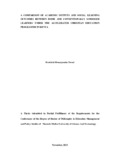A COMPARISON OF ACADEMIC OUTPUTS AND SOCIAL LEARNING OUTCOMES BETWEEN HOME AND CONVENTIONALLY SCHOOLED LEARNERS UNDER THE ACCELERATED CHRISTIAN EDUCATION PROGRAMME IN KENYA
Abstract
Education plays a pivotal role in fostering national unity, addressing social issues, and
driving economic development. The Sustainable Development Goals number four,
underscore the significance of quality education, with specific emphasis on ensuring
access to primary and secondary education for all. In this regard, the study compared
conventional schooling and home schooling in Kenya, where homeschooling provides
education at home under the tutelage and direction of the parent while conventional
schooling does the same but in a classroom environment under the tutelage of a
professional teacher. This is because, Kenya has embraced the goal of universal access
to basic education, particularly through a policy of 100 percent transition from primary
to secondary school. However, this policy, while laudable, raises concerns regarding
the exclusive focus on conventional schooling, with severe repercussions for noncompliance.
The purpose of this study was to compare the academic learning outputs
and social learning outcomes between home-schooled and conventionally schooled
learners enrolled in the Accelerated Christian Education (ACE) programme. The study
adopted a causal-comparative research design. Data were collected in Nairobi County
from ACEK centers and conventional ACE schools. A total of 63 conventionally
schooled and 37 home-schooled learners in grade 9 were sampled using a two-stage
cluster random sampling method that involved sampling the two categories of schools
in the first stage and the individual learners in the second. All parents of sampled
learners constituted the parental study group. The research employed independent
samples t-tests to compare academic learning outputs and Mann-Whitney U tests for
social learning outcomes, focusing on self-control, persistence, and social competence.
The study revealed no statistically significant difference in mathematics learning
outputs between home-schooled and conventionally schooled learners (t (98) = -0.638,
p = .525). Similarly, social studies learning outputs showed marginal differences but
were not statistically significant (t (98) = -0.239, p = .812). However, there was a
significant difference in English learning outputs between the two groups (t (98) = -
2.395, p = .019). Additionally, no significant differences was observed in social
learning outcomes, between the home-schooled and conventionally schooled learners.
The findings indicate that home-schooled learners can achieve learning output in
Maths that are comparable to their conventionally schooled counterparts.
Homeschooling exhibited a slight advantage in enhancing skills in English language.
Social studies learning outcomes were similar in both settings, highlighting the
effectiveness of homeschooling in delivering this subject. Furthermore, there were no
significant differences in social learning outcomes, emphasizing the equal potential of
learners in both settings. This study contributes valuable insights into the
homeschooling landscape in Kenya that homeschooling can yield comparable
academic outputs and social learning outcomes. Policymakers should consider
accommodating diverse learning approaches in this country. In view of the foregoing,
there is need for further research to explore the broader implications of these findings
in the Kenyan educational system.
Collections
- School of Education [45]

